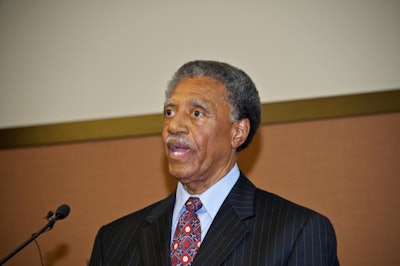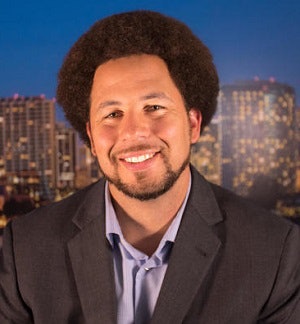To prepare Black students for the transition from postsecondary education to the workforce, San Diego State University (SDSU) created the Hal Brown Career Learning and Understanding Biases (HB CLUB) program.
 Harold K. Brown
Harold K. BrownIn 1998, philanthropists Malin Burnham and Bob Payne, working alongside San Diego civil rights leader Harold K. Brown, formed a group called “Community Leaders Undoing Biases” (CLUB), with the intent of holding conversations around race.
Because there was a limited number of new members joining or showing interest, the group eventually dissolved.
As an ode to CLUB and intrigued by SDSU’s diversity and inclusion efforts, Burnham and Payne donated $500,000 to help kick start a program on campus to support Black students.
Dr. J. Luke Wood, associate vice president for faculty diversity and inclusion at SDSU, said the donors “ensured that people are having differential outcomes that are positive in the labor market.”
“There are so many people who after the murder of George Floyd felt compelled to really do something for the African American community,” he said. “A lot of people attended different seminars to learn about challenges. They ordered a bunch of books. But what this group did, which is different, is they went beyond talk to actual action.”
Last year, the program was originally piloted under a different name. Now, however, the HB CLUB program, in honor of Brown, has since been enhanced to connect students to local industry leaders, focus on career preparation and discuss other topics not typically taught in the classroom like financial literacy.
The racial wealth gap between Black and White families has increased from around $100,000 in 1992 to $154,000 in 2016, according to a McKinsey and Company report.
“One of the program’s goals is to improve the financial literacy rate of Black students because it is taboo in the Black community,” said McKayla Shelton, a senior at SDSU. “Yes, you can take an accounting class but that does not show you how to manage your own finances and start your path toward generational wealth.”
 Dr. J. Luke Wood
Dr. J. Luke WoodShelton learned about the program through a flyer advertisement in the Office of Educational Opportunity Programs and Ethnic Affairs. Never being part of a program like HB CLUB, she wanted to learn something that would be “invaluable” to her as both a Black student and Black professional.
“This program is attempting to mitigate the knowledge gap for minority communities, especially the Black community,” she said. “It gives bright and brilliant Black students like myself a chance to make a difference and create generational wealth by exchanging knowledge.”
Another aspect of the program is career mentorship. Students have the opportunity to work with individuals in the workforce who are aware of the challenges faced by Black professionals. Additionally, they receive advice and strategies to navigate the labor market.
Black professionals only make up 3.2% of the senior leadership roles at large companies in the United States and 0.8% of all Fortune 500 chief executive officer positions, according to the Center for Talent Innovation.
“Our intended outcome is to provide support services for African American students at San Diego State to help level the playing field for their success,” said Payne in a statement. “We want to offer our students a more equal footing that they do not have today.”
Due to COVID-19, the program consisted of virtual workshops over Zoom which brought in speakers such as college and university presidents as well as industry experts to discuss bias, microaggressions and macroaggressions.
Other outcomes of the HB CLUB include developing a “thorough understanding of Black history, understanding the need to give back to Black communities and managing the intersections of identity, community and career preparation and planning,” according to SDSU.
With the donor’s goal of scalability, the program may eventually serve around 400 to 500 students on campus.
“We anticipate now with this incredible gift that we are going to be able to expand this out to really serve the lion’s share of our African American students, particularly those who are in their last two years of study,” said Wood, who is also a distinguished professor of education at SDSU.
He added that institutions around the country should be looking at SDSU’s HB CLUB program as a model.
The biggest takeaway from the program thus far for Shelton has been to “never stop pursuing knowledge.”
“It was not only the speakers giving me knowledge, I was giving the speakers knowledge as well,” she added. “So that exchange of knowledge, regardless of what level you are at, is necessary to grow.”
Sarah Wood can be reached at [email protected].


















